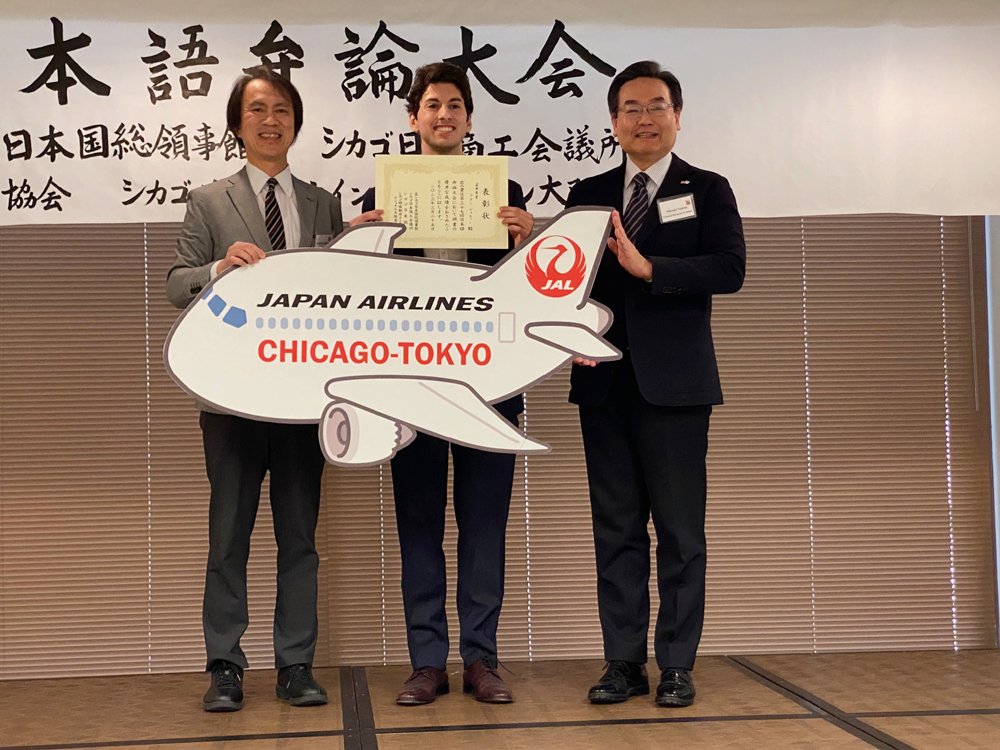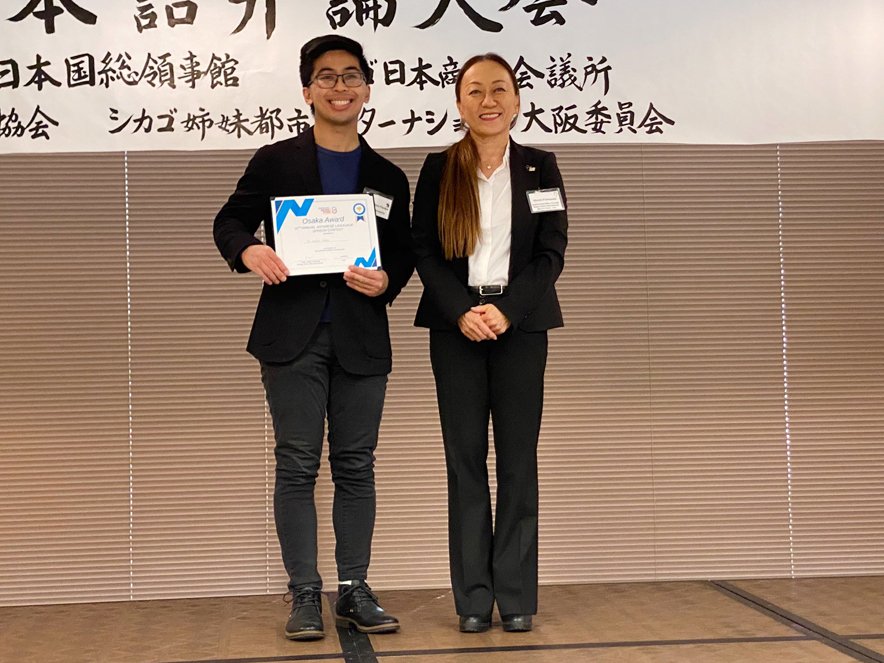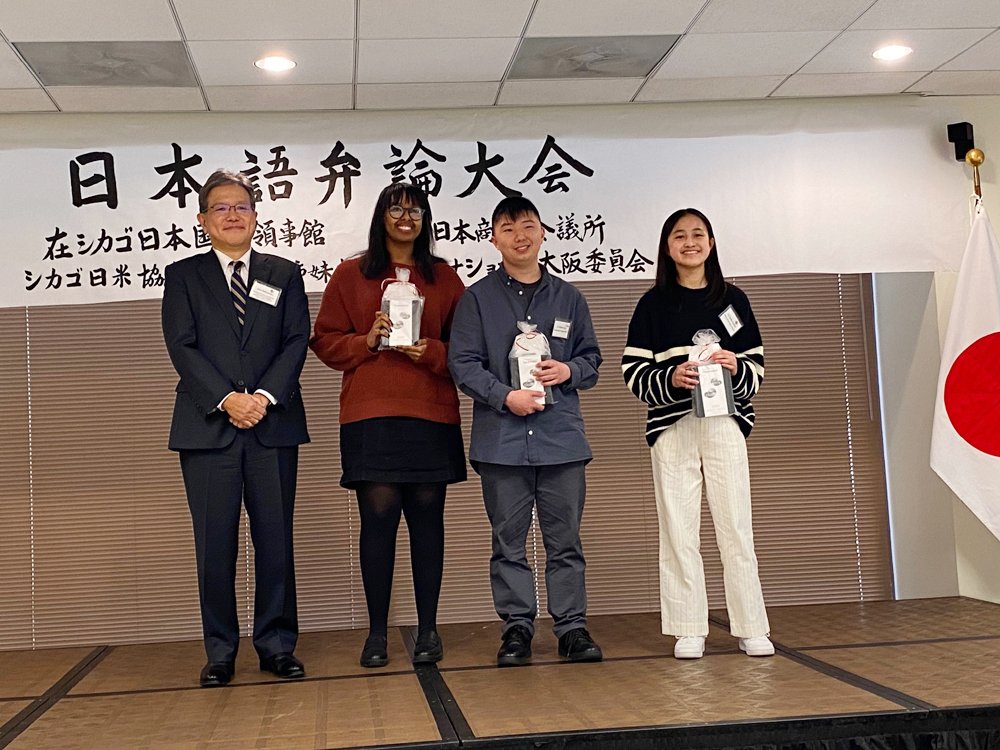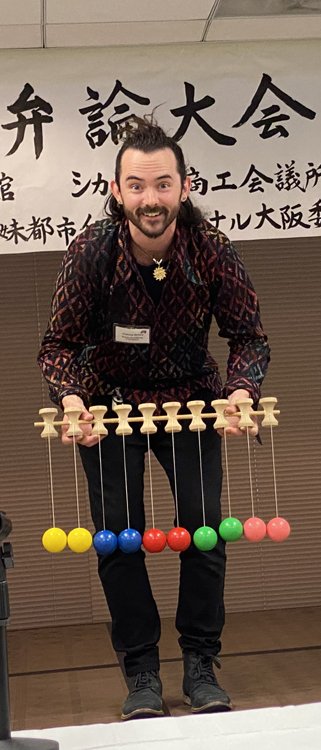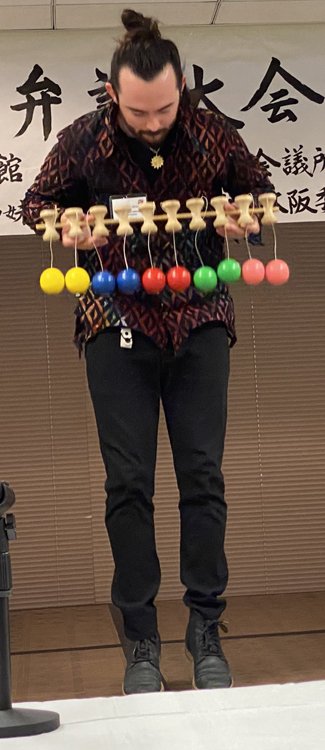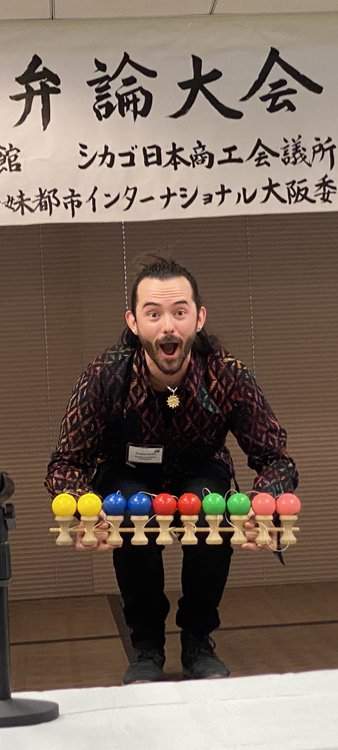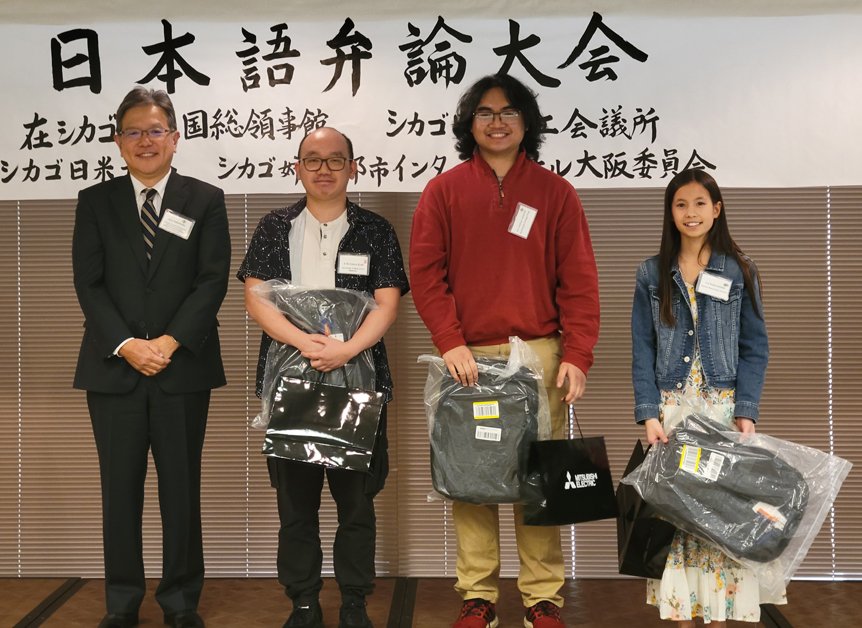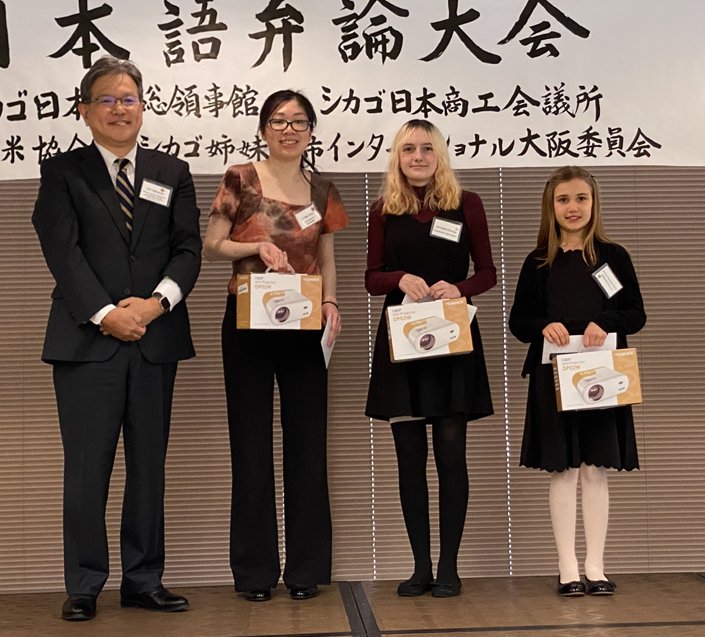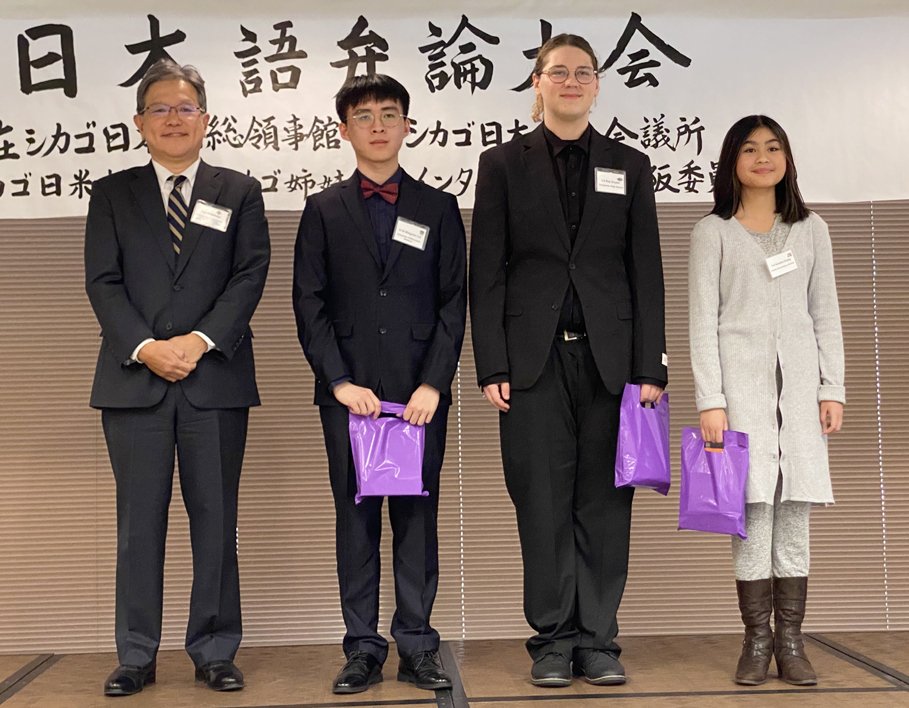37th Annual Japanese Language Speech Contest
28 Contestants Talk about Their Learning Experiences
Contestants of the 37th Annual Japanese Language Speech Contest (back rows) and judges
The 37th Annual Japanese Language Speech Contest took place at the Japan Information Center, the Consulate General of Japan in Chicago. The contest was held in-person for the first time in three years due to the COVID-19 pandemic, and 28 contestants from five states, Illinois, Indiana, Nebraska, Minnesota and Wisconsin, competed to show their Japanese language skills.
The annual contest invites students of elementary school through college in the Midwestern states. It is co-organized by the Consulate General of Japan in Chicago, Japanese Chamber of Commerce and Industry of Chicago, Japan America Society of Chicago, and Osaka Committee of Chicago Sister Cities International.
The contestants compete in three categories: 1st is for elementary and junior high school students; 2nd for high school students; and 3rd for college students. Following the speech, judges question each contestant in Japanese to test their understanding of the content. The contestants are evaluated for the quality of their speech as well as deliberation.
In his opening remarks, Consul General Hiroshi Tajima welcomed the participants and encouraged them saying, “For us, all the contestants here today represent hope for the future of the Japan-U.S. friendship,” and introduced stories of the past contestants who have used their Japanese language skills to find their own path to success while helping to strengthen the bonds between Japan and the U.S. in the process.
Steve Feldman, who won the Grand Prize at the 7th Contest, has become a popular YouTuber with a total of nearly 200 million viewers. He took advantage of his Japanese language skills and created Japanese/English bilingual videos on many topics including Japanese and American culture, food and cars.
Another contestant in the 14th Contest was Dr. Jason Jones, who won the Sister City Osaka Award and later received a Japanese government scholarship to attend graduate school at the University of Osaka. He went on to become an assistant professor and lecturer in Japanese studies both in the U.S. and abroad.
Consul General Tajima said, “These stories are just two examples of how one can use Japanese language skills to build a bridge between Japan and the U.S. Participating in this contest is a major step towards this goal, and we hope you will be proud of your hard work in reaching this stage regardless of the outcome.”
Consul General Tajima praised the teachers and parents for their tireless efforts to support the contestants, while acknowledging the sponsors, co-organizers and judges for their assistance.
He also thanked Joshua Grove, President and Director of the Sweets Kendamas Foundation, for his attendance to the Contest to introduce the kendama spirit.
Prize-winning Speeches
Connor Dewey from University of Wisconsin-Madison won the Grand Prize with his speech titled “Scar Tissue.”
Connor Dewey was born prematurely and had a hole in his abdomen and had to undergo surgery that made many scars on his stomach. He grew up and became a teenager, but didn’t have interests in much of anything except playing games. He was easily angered, getting into fights and a loser in most times.
However, the summer before he entered high school, he watched an anime “My Hero Academia” which moved him to realize that he had no goals or dream. He wanted to change himself and have fresh start to work harder.
Over the next year, his life was completely changed. He studied hard and did his homework, and then his grade was greatly improved. He thought that he would be able to take honors classes next year.
He also joined the cross-country club and found his rival who was an amazing runner. He wanted to work harder and began preparing for the next spring season to catch up with his rival
One day on the way to school, he was hit by severe pain in his stomach. It turned out that the pain was due to the scar from his surgery at birth, and it had spread like a spider’s web in his stomach. He had to undergo more surgery and stay in the hospital for several months.
Connor Dewey
He couldn’t eat, couldn’t stand up by himself, and of course he couldn’t race. He felt hopeless and all his efforts were in vain. His life was devastated.
During such a terrible time, his mother gave him a helping hand. She told him that if he gave up now, nothing would get better, no normal life, no honor class and no race any more.
Hearing those mother’s words, he was motivated to return to his normal life. He gradually became able to run again and eventually beat his rival although it took him a long time to fully recover.
“These scars shaped me into the person who I am today. Like this, our scars become a part of us and teach us the strength to never give up,” he said and concluded his speech saying that just as his mother did for him, everyone has the strength to reach out to help others because of the strength given by scars.
Dewey received 50,000 miles of JAL mileage donated by Japan Airlines.
William Pandes from DePaul University won the Sister City Osaka Award with his speech titled “The Power of Yes.”
William Pandes
Pandes introduced a wisdom, “if you want something, always say ‘Yes,’” from the movie “Yes Man.” He said, the moral of the story is that ‘Yes’ is a powerful word. I too, have felt the power of ‘Yes.’”
Last December Pandes was on a plane bound for Japan, but had to change it to another flight due to an engine trouble. A Japanese man, who was on the same plane and had hearing disability, seemed to be lost. Pandes asked himself if he would be better to talk to the man and answered himself, “Yes.” The two became friends and exchanged their phone numbers. The man was Mr. Tanaka and lived in Osaka.
When Pandes arrived at Narita, a Philippine man asked Pandes if he could borrow some money to buy a flight ticket to Philippines. Pandes said, “Yes,” because his family came from Philippines.
When Pandes arrived at Osaka, he realized that he didn’t have enough money for a hotel fee. He prayed for god’s help, and then a text message came from Mr. Tanaka. It said, “Would you like to stay my home?” Of course he replayed, “Yes.”
When Pandes was small, his parents instructed him to say, “No,” whenever stranger gave him candies, so he became anxious to sleep in somebody’s home.
While he was sleeping, he sensed somebody’s presence and saw a shadow of a man who was holding a knife. He was trembling with fear, and the shadow said, “Do you want more blankets?” It was Mr. Tanaka. Pandes said, “Yes.”
The next day Tanaka family took him to Osaka Castle and taught him about Japanese history and culture. He enjoyed spending an afternoon time with the family.
Mr. Tanaka’s wife, Fumi, thanked him for helping her husband on the plane and accepting Mr. Tanaka’s sudden invitation to their home. She said she was surprised his acceptance because most people would decline such a sudden invitation. He laughed and told her that he wanted to go on an adventure in Japan.
In conclusion, Pandes said, If I had said “No” to myself, to the Philippine man, and to Tanaka-san, I would not have gotten the chance to meet Tanaka-san. I would surely not have had the chance to go on an adventure in Osaka.” He is going to meet Mr. Tanaka again. “I want to treasure the first friend that I met thanks to the power of ‘Yes,’” he said.
Pandes received a round-trip ticket to Osaka with a two-week home stay donated by the Osaka Committee.
Ayaan Said
Ayaan Said form University of Minnesota was the winner of the First Prize in the first category. Her speech was titled “My Unforgettable First Trip Abroad.”
Ayaan Said’s family consists of her mother, siblings and herself. Although she has not lived in poverty, she started to work for a part time job during her senior year in high school. She wanted to help her mother who was always working for her family.
Gradually her saving has grown, so Said, who has been studying Japanese for four years, decided to travel to Japan with her friend.
Her mother thought that Said was too young to go abroad and opposed her decision, but she thought that she might be able to find what she really want to do in her future, so she determined to visit Japan.
When she got on an airplane, she could not help crying because she missed her mother so much, but her loneliness disappeared soon after she arrived in Japan. There was an elder couple living near her hotel, and the couple, who were very kind, often talked to her and praised her Japanese skills.
Being an African American, Said researched stories, especially, African American experiences in Japan. She found many stories that elder people mistreated black people; local people didn’t want to sit next to them in the train; or people suddenly grabbed their hair.
Said said, “I mentally prepares myself for such an occurrence, but ultimately, there was no need to do so.” Through this experience, she said, “I realized that one should not rely on the experience of others or make assumptions until really experiencing it themselves.”
Said was afraid of talking to others before going to Japan, but she discovered the joy of conversation in Japan and said, “I look forward to meeting a variety of people and want to understand their culture and lifestyle more.” She continued, “I gained confidence that I never had before. Thanks to this experience, I felt that I had grown as a human being.”
Said saw how vast the world was and began to realize what she wants to do in the future. “I was able to feel firsthand that the world is a big place and venture out into that big world. Until you experience it for yourself, you can face yourself and see the world in a way that you cannot get from the internet or other people. I realized this when I went to Japan,” she concluded.
Said received a $100 gift card donated by Sumitomo Corporation of Americas and Wireless Stereo Earphones donated by Panasonic Connect North America.
After the contest ended, Margaret O’Connell, Japanese Language Teacher of Evanston Township High School, talked about her own experiences in language learning journey. Before becoming teacher in Evanston, she participated in JET Program and taught English to Japanese students.
O’Connell greeted and appraised the contestants for their hard work and said, “I’m so moved and so incredibly impressed when the maturity of things that you reflected on your speech. Your experiences, your identities, all these things you spoke in your speech.”
O’Connell started studying Japanese language when she was 14 years old. She said learning language really meant seeing the world through different eyes, having access to new culture and new ideology.
She also said learning new words was endless and mentioned about popular manga “Maikosanchi no Makanaisan (A Chef in Maiko-san’s House). To understand the story, she has to learn about Kyoto dialect and unique Maiko language.
O’Connell interprets language learning is really a life-long commitment. She reads Japanese newspapers regularly to see new vocabulary words which continue to appear in front of her eyes. “I’m still on my own language learning journey,” she says.
She advised contestants, “Those things are not like discouraging things, but rather an opportunity because language studying is infinite. There are so much to keep going, so don’t be discouraged by that. Take that opportunity to grow your language.”
Joshua Grove instructs how to play kendama.
Joshua Grove appeared on the stage with many kendamas while judges were working on contestants’ speech results. He showed many ways to manipulate kendamas for joy and challenge. His amazing challenges were manipulating string of 10 or five kendamas. He made no mistake by his mental concentration.
He put four contestants on the stage and asked them to play kendama. After several challenges, one contestant left without success. Instead he let her go, Grove let her challenge it until she made success. Grove called for the audience’s handclaps to cheer her up.
He said that kendama was not just a toy, but a tool for mentality training. He reminded the audience of the situation. A contestant left alone without success and had to continue doing kendama in front of the audience under the time constraints while she was feeling inferior and embarrassment. Under the tremendous pressure she made success.
After the kendama presentation, contestants and their families were treated with delicious sushi and sweets prepared by Consul General’s official Chef Satoshi Ito.
Award winners
Grand Prize:
Connor Dewey
Sister City Osaka Award:
William Pandes
1st Prize:
Sofia Gulfan, Edward Lee, Ayaan Said
2nd Prize:
Anja Lebata, Joshua Jimenez, Calvin Eckl
3rd Prize:
Lila Dondzik, Edith Estridge, May Vang
4th Prize:
Aviana Dulay, Petra Tilden, Bingxian Lin
JASC Award:
Grace Kebata, Gretta Burke, Tyler Hunter
IATJ Award:
Bryce Thoma, Amanda Lambert
JIC Award:
Noelle McLendon, Zachary Deutsch, Petra Tilden, Nina Djukic, Heather Bey, Brandon Classey, Aishi Wang, Sonya Davis


